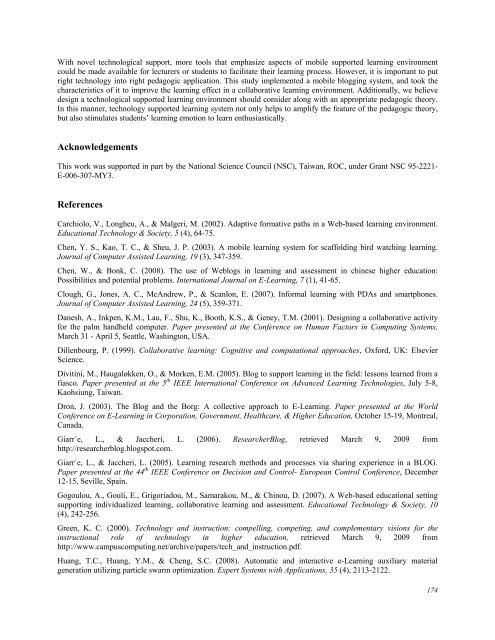Download - Educational Technology & Society
Download - Educational Technology & Society
Download - Educational Technology & Society
You also want an ePaper? Increase the reach of your titles
YUMPU automatically turns print PDFs into web optimized ePapers that Google loves.
With novel technological support, more tools that emphasize aspects of mobile supported learning environment<br />
could be made available for lecturers or students to facilitate their learning process. However, it is important to put<br />
right technology into right pedagogic application. This study implemented a mobile blogging system, and took the<br />
characteristics of it to improve the learning effect in a collaborative learning environment. Additionally, we believe<br />
design a technological supported learning environment should consider along with an appropriate pedagogic theory.<br />
In this manner, technology supported learning system not only helps to amplify the feature of the pedagogic theory,<br />
but also stimulates students’ learning emotion to learn enthusiastically.<br />
Acknowledgements<br />
This work was supported in part by the National Science Council (NSC), Taiwan, ROC, under Grant NSC 95-2221-<br />
E-006-307-MY3.<br />
References<br />
Carchiolo, V., Longheu, A., & Malgeri, M. (2002). Adaptive formative paths in a Web-based learning environment.<br />
<strong>Educational</strong> <strong>Technology</strong> & <strong>Society</strong>, 5 (4), 64-75.<br />
Chen, Y. S., Kao, T. C., & Sheu, J. P. (2003). A mobile learning system for scaffolding bird watching learning.<br />
Journal of Computer Assisted Learning, 19 (3), 347-359.<br />
Chen, W., & Bonk, C. (2008). The use of Weblogs in learning and assessment in chinese higher education:<br />
Possibilities and potential problems. International Journal on E-Learning, 7 (1), 41-65.<br />
Clough, G., Jones, A. C., McAndrew, P., & Scanlon, E. (2007). Informal learning with PDAs and smartphones.<br />
Journal of Computer Assisted Learning, 24 (5), 359-371.<br />
Danesh, A., Inkpen, K.M., Lau, F., Shu, K., Booth, K.S., & Geney, T.M. (2001). Designing a collaborative activity<br />
for the palm handheld computer. Paper presented at the Conference on Human Factors in Computing Systems,<br />
March 31 - April 5, Seattle, Washington, USA.<br />
Dillenbourg, P. (1999). Collaborative learning: Cognitive and computational approaches, Oxford, UK: Elsevier<br />
Science.<br />
Divitini, M., Haugaløkken, O., & Morken, E.M. (2005). Blog to support learning in the field: lessons learned from a<br />
fiasco. Paper presented at the 5 th IEEE International Conference on Advanced Learning Technologies, July 5-8,<br />
Kaohsiung, Taiwan.<br />
Dron, J. (2003). The Blog and the Borg: A collective approach to E-Learning. Paper presented at the World<br />
Conference on E-Learning in Corporation, Government, Healthcare, & Higher Education, October 15-19, Montreal,<br />
Canada.<br />
Giarr´e, L., & Jaccheri, L. (2006). ResearcherBlog, retrieved March 9, 2009 from<br />
http://researcherblog.blogspot.com.<br />
Giarr´e, L., & Jaccheri, L. (2005). Learning research methods and processes via sharing experience in a BLOG.<br />
Paper presented at the 44 th IEEE Conference on Decision and Control- European Control Conference, December<br />
12-15, Seville, Spain.<br />
Gogoulou, A., Gouli, E., Grigoriadou, M., Samarakou, M., & Chinou, D. (2007). A Web-based educational setting<br />
supporting individualized learning, collaborative learning and assessment. <strong>Educational</strong> <strong>Technology</strong> & <strong>Society</strong>, 10<br />
(4), 242-256.<br />
Green, K. C. (2000). <strong>Technology</strong> and instruction: compelling, competing, and complementary visions for the<br />
instructional role of technology in higher education, retrieved March 9, 2009 from<br />
http://www.campuscomputing.net/archive/papers/tech_and_instruction.pdf.<br />
Huang, T.C., Huang, Y.M., & Cheng, S.C. (2008). Automatic and interactive e-Learning auxiliary material<br />
generation utilizing particle swarm optimization. Expert Systems with Applications, 35 (4), 2113-2122.<br />
174
















